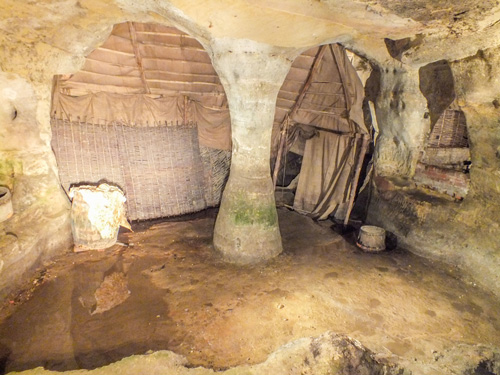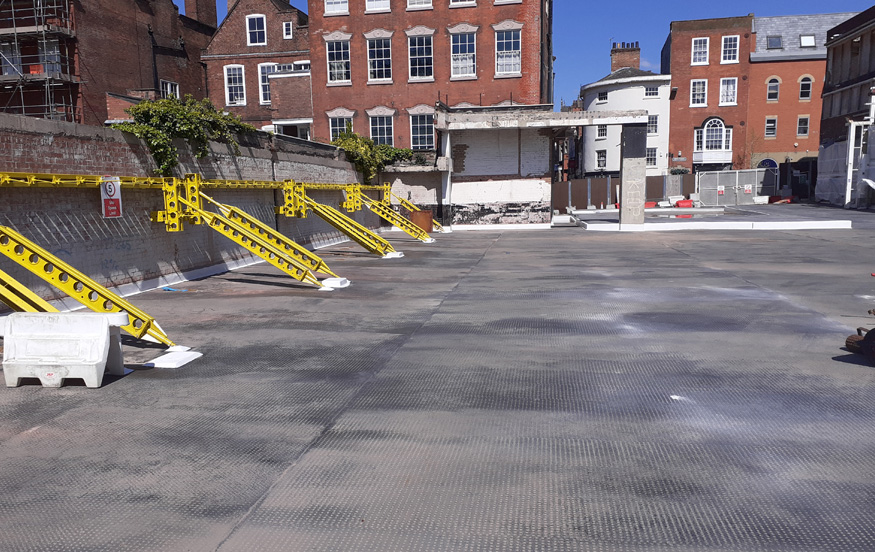Although mastic asphalt is one of the world’s most traditional roofing materials, there are many innovative and varied applications. In one recent project carried out by a Mastic Asphalt Council (MAC) contractor member, mastic asphalt was actually used to prevent water penetration into an ancient sandstone cave beneath the underlying surface.
The installation was carried out in Nottingham which has the UK’s largest network of caves, with over 800 hidden beneath its streets. It was so impressive that the mastic asphalt application, carried out by NRA Roofing & Flooring Services Ltd, was winner of one of the Project of the Year categories at the Mastic Asphalt Council’s (MAC) Awards 2023.
The project was carried out at Nottingham’s Broadmarsh Shopping Centre, under which the most famous caves are located. The shopping centre was previously owned by Intu which went into administration during the first COVID lockdown. It has been partly redeveloped, whilst other areas have been demolished. NRA Roofing & Flooring Services were tasked with providing a suitable solution that would help reduce water ingress, manage surface water and provide a durable finish.
IKO’s mastic asphalt systems were specified to withstand numerous details, substrates and levels, and to provide a waterproofing solution and durable trafficked surface. As the shopping centre is located beneath the sandstone cave, the project posed a particular challenge in that water was leaking in from above.
 Prior to the refurbishment works, the now popular tourist spot was accessed by the centre’s upper mall. Nottingham City Council was highly impressed with the IKO system and Heritage England was equally pleased that water had stopped leaking into the caves following installation. Although the entrance to the caves has since been relocated, it was important that construction did not compromise the integrity of the site and the safety of the subterranean visitors was prioritised throughout the project.
Prior to the refurbishment works, the now popular tourist spot was accessed by the centre’s upper mall. Nottingham City Council was highly impressed with the IKO system and Heritage England was equally pleased that water had stopped leaking into the caves following installation. Although the entrance to the caves has since been relocated, it was important that construction did not compromise the integrity of the site and the safety of the subterranean visitors was prioritised throughout the project.
One of the distinct advantages of mastic asphalt is its versatility. In recent years, there has been an influx of projects where mastic asphalt screeds have been used to provide a stable and cost-effective base for waterproofing applications – from green roofs to car park decks.
Unlike traditional cement screeds which can be slow to cure and labour intensive, there are mastic asphalt screeds available that cure rapidly even in inclement weather conditions and can be walked on within just 60 minutes, making them ideal for fast-track projects where other trades are waiting to get to work and the screed needs to trafficked or overlaid quickly. Mastic asphalt screeds have zero water content, eliminating the time taken for moisture to evaporate in traditional screeds and eradicating the risk of cement stained water penetrating into the underlying structure.
The flexibility and fast curing times of mastic asphalt screeds enable roofing contractors to achieve precise drainage falls quickly and more efficiently, level out uneven substrates and provide a stable base for a specified roofing deck system. Laid at a minimum thickness of 10mm, the screed thickness is up to 80% less than traditional materials, making it much lighter and equally suited for both refurbishment and new build projects.
Able to be applied to in-situ and precast concrete, timber and plywood, mastic asphalt screeds are suitable for use below cold roofs, insulated warm roofs, inverted insulated roofs, green roofs, balcony and terrace applications, walkways, footbridges and both car park and HGV service decks. For full waterproofing protection, mastic asphalt screeds can be overcoated with mastic asphalt roofing systems, as well as other roofing systems such as felt, hot melt roofing, liquid coatings and single ply roofing.
This article featured within the December 2023 edition of RCi magazine – click here to view the article.

